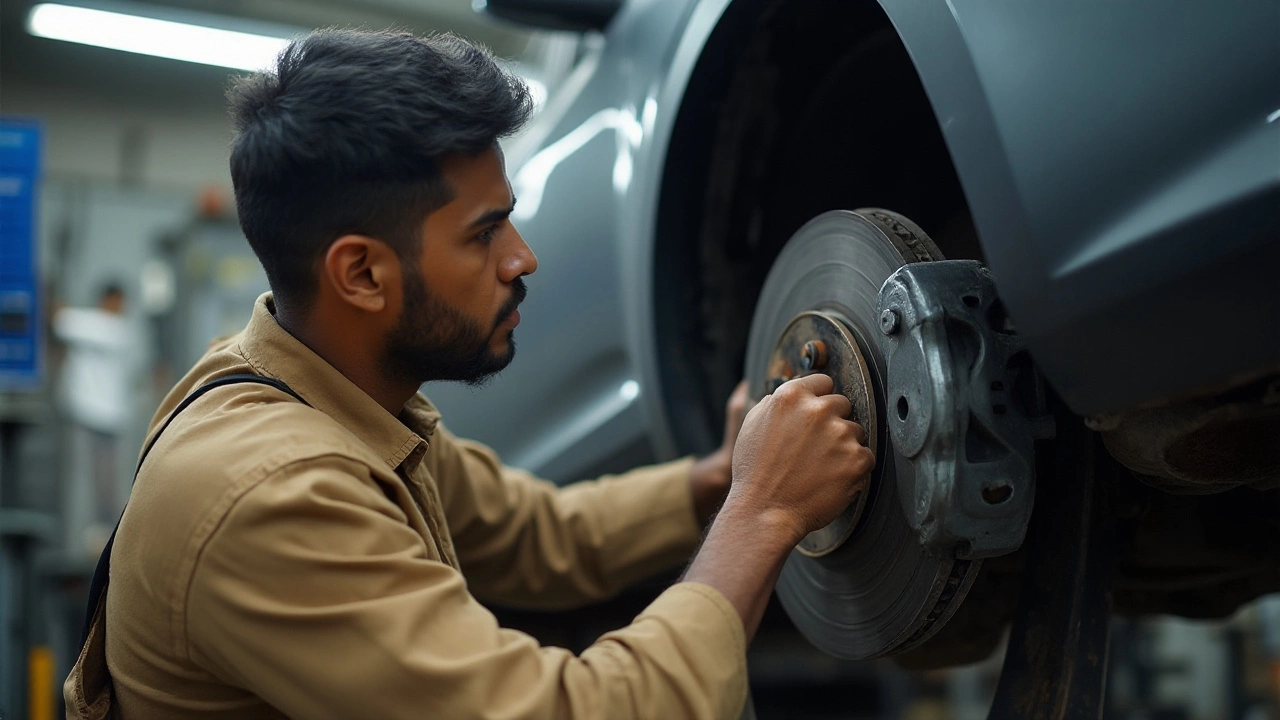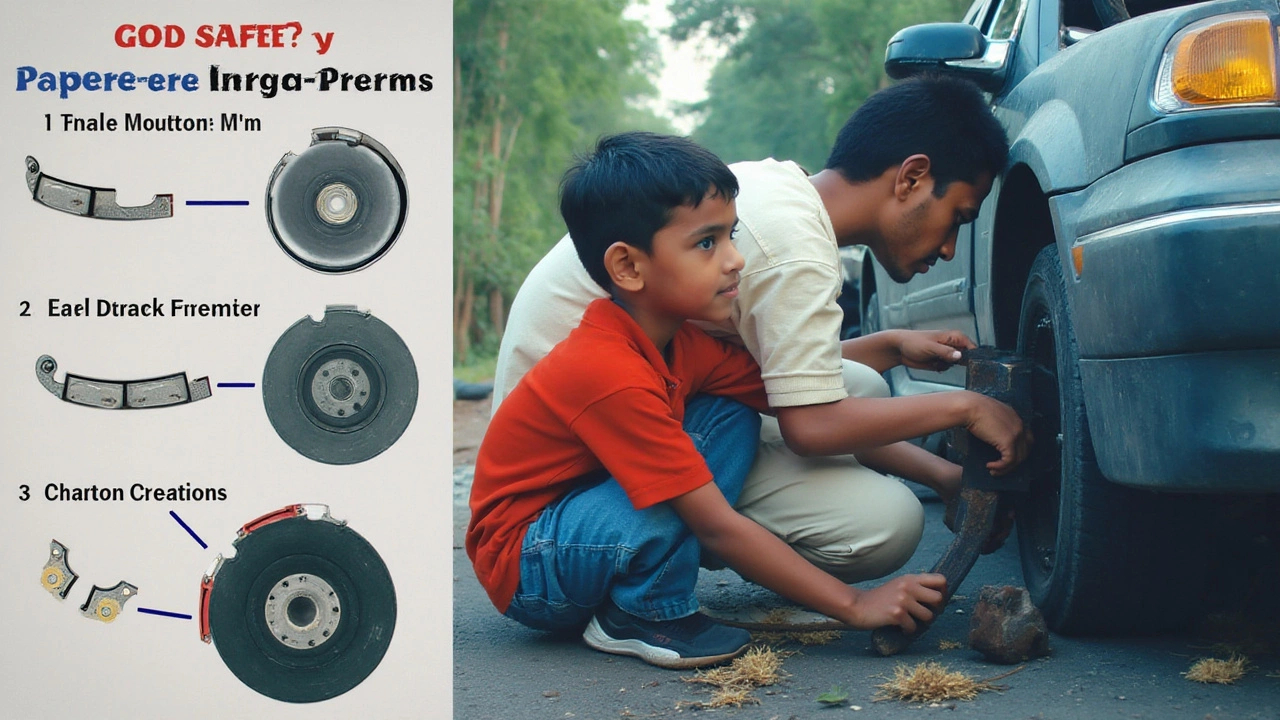Is Driving with Grinding Brakes Dangerous?
 Jan, 18 2025
Jan, 18 2025
Have you ever been driving along when an unsettling sound starts to emanate from your wheels? The metallic, rasping noise known as grinding can send a shiver up any driver's spine. Brakes are an essential part of driving that deserve your attention, especially when they start making strange noises.
While some might dismiss it as a minor inconvenience, grinding brakes are often a red flag highlighting deeper issues. Whether it's general wear and tear, rusted components, or failing brake pads, these sounds demand immediate attention. Driving with brakes in distress can be risky, both for the car's health and for you as a driver.
Understanding why brakes might grind and how to deal with the problem effectively can save you a lot of hassle down the road. Let's delve into the reasons behind those squeals and grinds to help you stay safe while driving.
- Recognizing the Warning Signs
- Why Brakes Grind
- Immediate Risks Involved
- Potential Damage to Your Vehicle
- When to Consult a Professional
- Tips to Maintain Healthy Brakes
Recognizing the Warning Signs
When it comes to vehicle maintenance, one of the most critical aspects is understanding your car's language, especially when it comes to its braking system. A car is an ensemble of mechanical parts that communicate its needs through various sounds and sensations. One of the most alarming signs is the ominous sound of grinding brakes. Identifying the signs early can save both money and ensure your safety on the road. But what exactly should you be on the lookout for, and how can you interpret these signals accurately?
One of the most distinguishable indicators of problematic brakes is the noisy interruptions that begin as the vehicle comes to a halt. These noises might range from a mild hiss to the more worrying metallic grind indicative of bare metal on metal contact. Typically, this suggests that the brake pads have worn down completely and need immediate replacement. Ignoring this signal is risky as it can lead to severe damage to the rotors, resulting in costly repairs.
Apart from the ominous sound, another early sign is the feel underfoot when you press the brake pedal. A pulsating brake pedal often points to issues like warped rotors. It's essential not to dismiss these vibrations as they affect your stopping power significantly. Similarly, a brake pedal that feels unusually soft can indicate air or moisture in the brake lines, presenting another layer of danger while driving.
Besides audible and tactile signs, visual inspection can reveal a lot about the state of your brakes. Some cars allow a visual inspection of the brake pads through the wheel spokes. If you notice the pad is less than a quarter of an inch, it's time to consider replacing them. Failing to do so invites the risk of total brake failure. Professional mechanics recommend periodic checks, even if you think everything seems normal.
Driving with these warning signs is never advisable. The National Highway Traffic Safety Administration (NHTSA) advises immediate attention to these symptoms before they escalate into life-threatening situations. As author Carl Sagan wisely said:
“Science is more than a body of knowledge; it is a way of thinking.”In other words, adopting a vigilant mindset towards car maintenance can significantly reduce risks and enhance safety.
If you're unsure or uneasy about diagnosing the issue yourself, visiting a certified mechanic is always a good option. They can run diagnostic tests to pinpoint the exact cause of the grinding brakes, offering the peace of mind that comes with professional expertise. A timely diagnosis and repair can mean the difference between a minor fix and major vehicle overhaul, not to mention the safety benefits it grants.
Why Brakes Grind
The unsettling sound of grinding brakes is more than just a minor annoyance; it's a call to understand what's going on beneath the hood. The most common reason behind this noise often traces back to worn-out brake pads. When the friction material on brake pads wears away completely, the metal backing comes into contact with the rotor. This not only leads to the screeching sound but also risks serious damage to the rotor if not addressed promptly.
Another culprit could be debris that gets trapped between the brake pads and rotor. Small stones or dirt particles can cause those ominous grinding noises and increase the wear on the brake pads over time. Keeping your wheels clean can sometimes prevent such nuisances. Corrosion is also a factor worth noting, especially in colder or more humid climates where rust is prevalent. Once rust forms on the brake components, it can lead to grinding as well.
Recognizing Pad Wear
Brake pads do not have infinite lifespan, and there are certain signs indicating they're reaching the end. Besides the nerve-wracking grind, you may notice a reduction in braking efficiency or an increase in stopping distance, both of which are serious safety concerns. Pay attention if your vehicle's pulling to one side or if the pedal feels spongey, as these can also be indicators of worn out brake pads. Prompt attention to these signs can save you from bigger headaches down the road.
Expert Opinions on Grinding Brakes
"Ignoring grinding brakes is akin to driving blind. You may not realize the hazard until it's too late," says Mike Spencer, a renowned automotive safety expert. He stresses the importance of immediate action once grinding occurs, to prevent escalated damage.
The difference in materials used for brakes can play a role too. Ceramic pads, for instance, tend to be quieter and produce less dust compared to metallic pads, but they can still fall prey to grinding if neglected. Keeping a regular check on brake components can help detect early signs of wear, preventing costly repairs and ensuring you enjoy a smooth and safe drive.
Tips for Prevention
To prevent the dreaded grinding brakes, regular maintenance is key. Having your brake system checked by professionals at least twice a year is advised, especially if you often drive in heavy traffic or mountainous terrain where brake usage is frequent. Listening for unusual sounds and seeking timely professional assistance are beneficial practices that can extend the life of your vehicle's braking system.
Addressing grinding noises promptly ensures that your vehicle remains safe and operational. Comprehensive inspections, consistent maintenance, and being alert to changes in your brakes will keep grinding noises at bay, allowing you to drive with peace of mind.

Immediate Risks Involved
When you hear the unsettling sound of grinding brakes, it's crucial to grasp the gravity of the situation. Ignoring this persistent noise can pose several immediate risks not just to your vehicle, but to your safety as well. At the heart of this issue lies the integrity of your brake pads. These components are designed to ensure safe stopping by creating friction against the rotor. When they wear down completely, the metal housing can grind directly against the rotor—causing that unmistakable metallic sound. This kind of grinding doesn't just damage your rotors over time; it immediately reduces your ability to brake effectively, increasing your risk of an accident.
This situation becomes even more perilous in conditions where efficient braking is critical. Consider sudden stops on a busy highway or slick roads during rainy weather. With compromised brakes, your stopping distance can exponentially increase, leading to fender benders or more severe collisions. Statistics suggest that faulty brakes are a significant contributing factor to road accidents. According to the National Highway Traffic Safety Administration, brake-related issues are responsible for roughly 22% of car accidents in the US annually. It's a statistic that underscores the immediate risk you're assuming if you dismiss that alarming sound your vehicle is making.
"A squeal might be annoying, but a grind could be deadly," warns a report by the Insurance Institute for Highway Safety, underlining the need for immediate attention to such a critical safety feature. The dangers lie not only in the inability to stop quickly but also in the potential for steering difficulty, as grinding brakes can tug on other components in your vehicle's braking system.
Another immediate risk involves the potential for cascading damage. The interaction of metal against metal wears down the rotor and can introduce tiny metal filings into your brake fluid. This can compromise the entire braking system, leading to brake failure over time. Not only does this result in costlier repairs, but this substantive damage might occur before you even experience a significant brake malfunction. This highlights an important consideration: fixing grinding brakes promptly can prevent numerous chain reactions in your vehicle's system that may affect your overall driving experience in a negative manner.
Potential Damage to Your Vehicle
When you hear that grinding sound each time you press the brakes, it's not just an annoying noise; it's a glaring sign of potential damage waiting to happen under your vehicle's hood. The most immediate concern with grinding brakes is the wear and tear on the brake pads themselves. Essentially, brake pads are engineered to slowly erode as they're used, but this grinding noise often indicates they've worn down completely, leaving the metal parts to clash directly with the rotor. If left unchecked, this metal-on-metal contact doesn't just stop the grinding—it exacerbates it, leading to substantial damage over time.
Beyond brake pads, another significant component at risk is the rotor. The rotor serves as the surface against which the brake pads clamp down to stop your vehicle. In normal conditions, the pads provide a buffer between the rotor and the metal parts of the brake system. A damaged rotor can drastically reduce your vehicle's stopping power, create uneven braking, and often leads to costly replacements. Repairing a rotor, or even worse, replacing it is an expense nobody wants to face. A warped or deeply scored rotor not only means less efficient braking but also causes vibrations that can spread to the steering wheel, posing a hazard for maintaining control over the vehicle.
It's important to note that allowing brakes to grind for extended periods could adversely affect the entire braking system. The calipers, an integral part of your car's brake system, might also be inspected prematurely as they struggle to adjust to the less-than-smooth rotor surface. Caliper failure doesn’t just result in poor braking performance; it can lead to catastrophic brake failure if not addressed promptly. Additionally, since these parts are intertwined within the wheel assembly, damaged brake components can also impact wheels and suspension, potentially leading to expensive and comprehensive repairs. Such issues highlight the importance of keeping your brake pads in check.
“Not paying attention to brake noise is one of the common mistakes car owners make, often leading to costly repairs that could have been avoided,” states Jane Evans, a renowned automotive expert from the National Vehicle Safety Society.
One might not realize that a poorly maintained brake system also affects tires more than expected. As the brakes make you stop unevenly, tires can wear down in patches rather than uniformly. This uneven tire wear can compromise traction, which becomes especially risky during adverse weather conditions like rain or snow. To avoid such scenarios, proactive maintenance and regular inspection can go a long way, ensuring both the safety of the driver and the longevity of vehicle parts. Remember, addressing that pesky noise sooner rather than later can save you a headache and a potential wallet-ache down the path of car ownership.

When to Consult a Professional
It's important to recognize when the grinding noise from your brakes indicates a problem that requires the skilled hands of an automotive expert. Often, the decision to seek help from a professional can make the difference between a minor fix and a major overhaul. Many drivers might wonder how to differentiate between a manageable issue and one that desperately demands expert attention. If you hear persistent grinding, it might be a sign that your brake pads have worn down entirely, allowing the metal components to rub against each other. This is not something you should ignore, as it directly affects your vehicle's ability to stop effectively. Ignoring these signs can lead to damage to the rotors or drums, potentially increasing repair costs exponentially.
One wise rule of thumb is to pay attention to how your vehicle behaves when you brake. If you feel vibrations, it might suggest that your rotors have become warped due to neglecting to replace worn pads. Additionally, if your car begins to pull to one side when you brake, it could mean the calipers are not functioning right, potentially posing a hazard. These are clear signals that it's time to bring your vehicle in for professional diagnosis. A professional mechanic can conduct a thorough inspection, spotting issues that might not be visible to the untrained eye. This proactive approach could prevent small issues from becoming more significant, costly repairs later on.
Seeking professional help ensures the root cause of the grinding brakes is identified accurately and timely. Brake systems are complex and involve several components working in harmony. Attempting to diagnose or fix them without proper training might lead to more harm than good. Christine Palmer, a renowned automotive expert, has noted,
"Brakes are arguably the most critical safety system you have. Never compromise when it comes to brake issues; trust the task to skilled professionals."With grinding brakes, the wisest course of action often involves an expert analysis to prevent any future mishaps.
In some cases, brake grinding might even be due to a factory defect. Mechanics can compare your case with manufacturer guidelines, checking for any recalls or warranty coverages that might save you from costly repairs. It's always best to err on the side of caution, especially with something as pivotal as your vehicle's safety mechanisms. Remember, maintaining healthy brakes not only involves personal vigilance but occasionally calling on the expertise of those trained specifically to keep your car in peak condition. It's unwise to delay professional intervention when your brakes grind, as addressing problems early often pays off in safety and savings.
Tips to Maintain Healthy Brakes
Ensuring your vehicle's brakes remain in top-notch condition isn't just about prolonging the lifespan of your car, but it's pivotal for your safety. Regular maintenance can prevent those unsettling sounds like grinding and squeaking, which could escalate into bigger issues. One common step to preserve brake pads is regularly checking and replacing them before they wear too thin. Depending on driving conditions and habits, brake pads should be inspected every 12,000 to 15,000 miles. Being preemptive usually prevents complications, like brake rotor damage, which could lead to heftier repair bills.
Keeping an eye on the brake fluid is equally crucial. Brake fluid plays a significant role in ensuring that your brake parts function properly. Over time, it can become contaminated with moisture, causing corrosion within brake components. Regular checking and timely replacement of brake fluid can usually keep the system in optimal shape. It's typically advised that brake fluid be flushed and replaced every two to three years. Proper fluid levels ensure that brake pressure is maintained consistently, thus enhancing your driving safety.
"Your brake system is not something to neglect. Consistent care can guarantee not just a longer vehicle life but a safer driving experience," says Thomas Gordon, a noted automotive expert.
Listening for any unusual noises and paying attention to the way your vehicle responds when braking can be surprisingly effective. While sometimes it can be hard to detect these noises within the hustle and bustle of city life, making it a habit to turn off the music and listen for a few minutes during each drive can be beneficial. Additionally, regularly checking for vibrations or changes in the brake pedal feel can serve as a strong indicator of potential issues. These vigilance habits not only help maintain your brakes but might save you from a preventable accident.
Regular Professional Inspections
While many maintenance tasks can be performed by the car owner at home, it is also vital to have a professional evaluate the brakes, ideally once or twice a year. An expert mechanic can diagnose things that an untrained eye might miss. They have the tools and expertise necessary to assess the condition of the brake rotors, calipers, and other components in greater detail. Professional insights can guide you on specific parts that might need attention or replacement, which helps in making informed decisions rather than assumptions that could prove costly.
Trust the Manufacturer's Recommendations
It’s always smart to refer to your vehicle’s owner manual for maintenance timelines and recommendations. Manufacturers design these cars with precision engineering, and their suggestions typically come from extensive testing and data. Whether it pertains to the lifetime of grinding brakes or the type of brake fluid suitable for your car, those details are tailored for your vehicle’s best performance. By adhering to the guidelines provided, you ensure all systems work harmoniously, reducing the stress on any single component, including your brakes.
Proper brake maintenance isn't always about what you do when your car is stationary, but also how you drive. For instance, aggressive driving habits, like abrupt stops and fast acceleration, can considerably fast-track brake wear. By adopting a more steady and less aggressive driving style, brake pads are conserved, and so are other critical vehicle parts. Considering these tips helps you not only keep your brakes healthy but also result in smoother rides and less frequent trips to the mechanic.